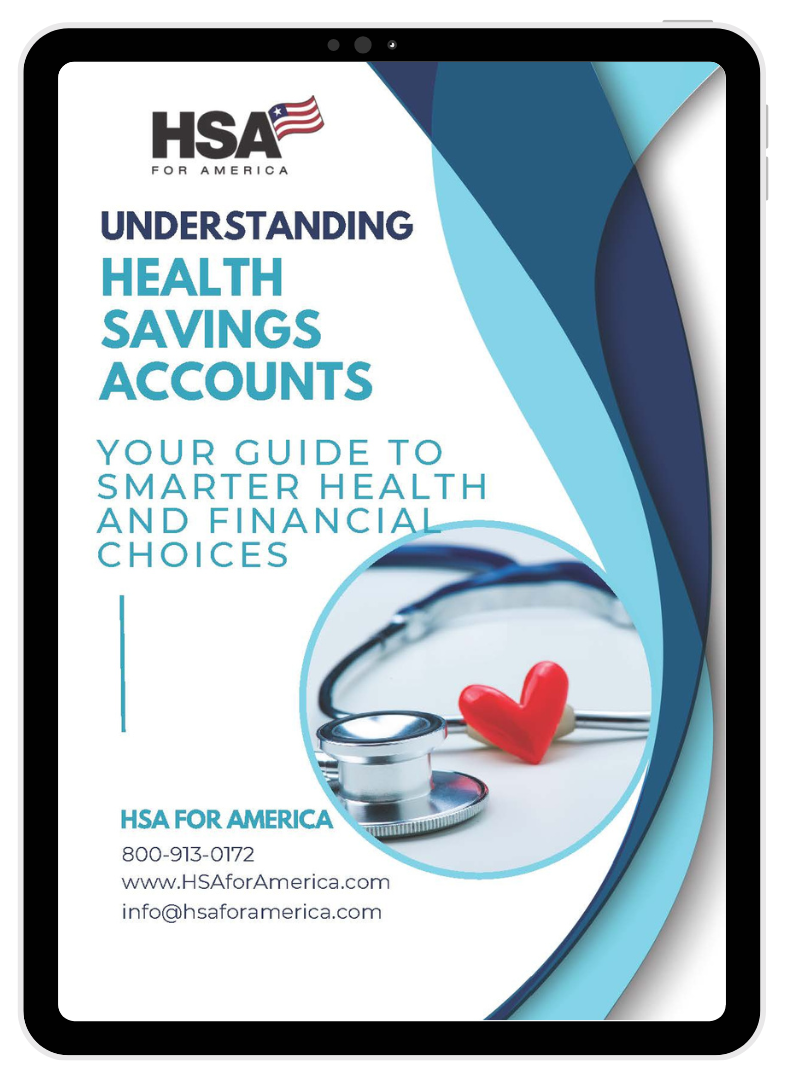HSA Insurance Plans
Give your family peace and security with HSA health insurance savings plans designed with your needs in mind.
View HSA Insurance Quotes

By Wiley Long III, President – HSA for America
Reviewed by Lou Spatafore – Fact checked by Misty Berryman – Updated 8/14/2025
HSA Insurance Plans, Also Known As High Deductible Health Plans, Can Help You Take Control of Your Health and Your Money
Lower your health insurance premiums and out of pocket costs
Make your medical expenses tax deductible
Cut your taxes by up to $2,200 per year
Why an HSA Insurance Plan?
HSA Insurance Plans Put You First
We believe that you are the best person to decide how to spend your health-care dollars. When people shop around for the best value, health care providers will charge lower rates to attract patients.
Flexibility in Treatment Options
HSA funds will cover alternative, holistic, and preventive treatments. This encourages innovation and investment in areas where the current system has failed to find solutions.
A Proactive Approach to Health
By making many preventive expenses eligible for coverage through HSA, you get ahead of costs. With HSA insurance plans, you can take a more proactive approach to your own healthcare. And you can keep the money you don’t use!
View HSA Insurance Quotes in Your Area
The Benefits of HSA Insurance Plans
There are countless benefits of HSA insurance plans. We’re here to shine a light on a few of them:

1. How Does an HSA Account Work?
A Health Savings Account is a tax-favored savings account combined with an insurance or healthshare plan. HSAs allow you to deposit tax-deductible funds into a savings account. This account is designed specifically so you can use it to cover medical costs. Eligible medical expenses could include:
- Preventative care,
- Routine appointments,
- Emergency care,
- And more.
Individual HSA health insurance plans are highly flexible. They can be used for any medical procedure you like, as long as it is a qualified expense.
To qualify you must have a high-deductible health insurance plan that qualifies to be partnered with an HSA. Money in the savings account can help pay the deductible. Once the deductible is met, the insurance starts paying. Money left in the savings account earns interest and is yours to keep.

2. Are HSA Insurance Accounts Tax Deductible?
Health savings accounts (HSAs) allow you to legally avoid federal income tax. This is a legal means of lowering your pre-tax basis through eligible savings accounts. They save up to $4,300 for singles or $8,550 for families in your HSA health plans account. For 2026, the HSA contribution limits are $4,400 for self-only coverage and $8,750 for family coverage. * Open an HSA with the bank or HSA Administrator of your choice.
You will receive a federal income tax deduction for money deposited. This deduction stands even if you take the standard deduction and don’t itemize your deductions. This tax deduction is available to everyone with no limitations on the amount.
Most states also allow the same deduction for state income taxes. This can potentially add to your savings.
A one-time roll-over from your IRA (Individual Retirement Account) or FSA (Flexible Spending Account) is even allowed. Simply deposit into your HSA insurance plan’s account and enjoy the savings!
If your employer makes an HSA contribution for you, it is “excluded” from income. Even better, it is not subject to any income tax or FICA. Either way, this will immediately reduce your federal income tax due for the year.
* Individuals age 55 and over may deposit into their account (and take a tax deduction on) an additional catch-up contribution of $1,000.

3. Do HSAs Enable Tax-Subsidized Medical Expenses?
HSAs allow you to spend the money in your account tax-free to pay for qualified medical expenses. The money is available even if you have already received a tax deduction from the amount. It is a means of lowering your out of pocket expenses on medical services.This includes any fees from going to the doctor, purchasing prescription drugs, or paying expenses towards your deductible. Once your deductible is met, the HSA health insurance covers your medical expenses as defined in the policy.
In addition to these benefits, your HSA insurance plan’s funds can go even further. You can use your HSA account to cover other qualified expenses not normally covered by a health insurance policy.
Also, your HSA can be used to pay these health care expenses for any spouse or dependent member of the family. This includes same sex and domestic partners. Even if they are not covered under the insurance policy, they are applicable for your HSA.

4. Does HSA Insurance Offer Premium and Tax Savings?
Health Savings Accounts can help you save money on both your insurance premiums and your income taxes. And as any savvy saver knows, tax advantages and monthly premiums can’t be overstated.Because HSAs must be paired with a high-deductible health plan (HDHP) and are sometimes paired with health sharing plans, savings abound. Your health care costs are often much lower than a typical plan.
The savings from the lower monthly costs along with the tax-free deductions could be $10,000 or more every year. This is one of the largest and most obvious benefits of pairing HSA insurance plans with high deductible health plans.
Below is an example comparing typical non-HSA plan costs compared to an HSA plan within a health sharing program.
This example is based on the average health insurance premium for a family of four living in a metropolitan area. Covered medical expenses in this example total $2000 and $550 in expenses for dental care, contacts and eyeglasses.
If you still have questions about HSA medical insurance benefits, we invite you to download our helpful guide below:

Understanding Health Savings Accounts
Free PDF Download
Read on-the-go and understand the many benefits of owning a health savings account.
What a family could save with an HSA insurance Plan.
The benefits of HSAs don’t just stop at individual HSA health insurance plans. In truth, families stand to save enormously when relying on these helpful plan types. Here is an example of one such family:
| Typical Non-HSA Plan $7500 Deductible: 80% / 20% Coinsurance |
HSA Plan melded with a Health Sharing Program*, $1000 IUA (initial unshared amount) |
|
|---|---|---|
| Annual Premium | – $16,812 | – $7,860 |
| Insured’s Share of Medical Costs ($2,000 claim) | – $2,000 (full amount) | – $1000 (rest paid by healthshare) |
| Non-Covered Expenses | – $550 | – $550 (dental and eye wear expenses) |
| Expenses Subtotal | = – $19,362 | = – $9,410 |
| Federal Tax Savings* | + $0 | + $1,752 |
| State Tax Savings* | + $0 | + $365 |
| Net Expenses (out-of-pocket minus savings) | – $19,362 | – $7,322 |
| Total (Net Savings with HSA Plan) |
= +$12,040 in Savings! |
*A health sharing program is not health insurance, but rather a program that facilitates sharing of medical expenses among members. Go here to learn more about our health sharing program that can be paired with an HSA. If you are a member of a healthshare, learn about an HSA-qualified preventive plan that can be added to healthshare. Plans are available for as low as $85 a month.
HSA-Compatible Health Sharing
We also offer health sharing plans that are compatible with HSAs. Health sharing is not health insurance, but it acts in a similar way to protect you from large medical expenses, at a much lower cost than health insurance. Check out the HSA Premium1 plan to learn more.
Find the perfect Health Care Plan for your medical coverage today with HSA for America.
Need Assistance?
Get Help in Figuring Out the Best Plan for You
Schedule a free appointment with our Personal Benefit Managers. It’s fast, friendly and easy with no obligation.
Ready Now?
Request an Insurance Quote in Your Area
Available Plans | HSA Info | Healthshare Info | FAQS | Blog | News | About Us | Contact Us | Privacy Policy | Agents Needed

Contact Information:
1001-A E. Harmony Rd #519 Fort Collins, CO 80525
800-913-0172
info@HSAforAmerica.com
Disclaimer: All information on this website is relayed to the best of the Company's ability, but does not guarantee accuracy. Information may be out of date. The content provided on this site is intended for informational purposes only and does not guarantee price or coverage. This site is not intended as, and does not constitute, accounting, legal, tax, and/or other professional advice. Determination of the actual price is subject to the Carriers.
